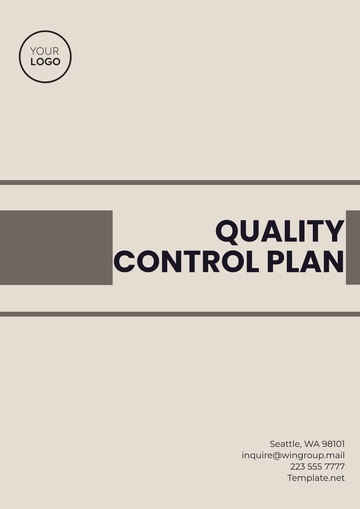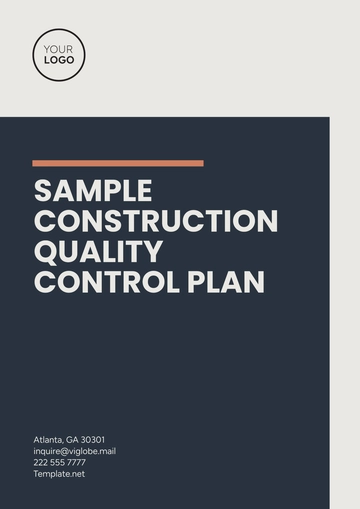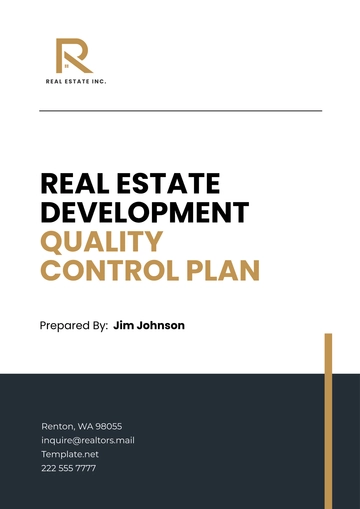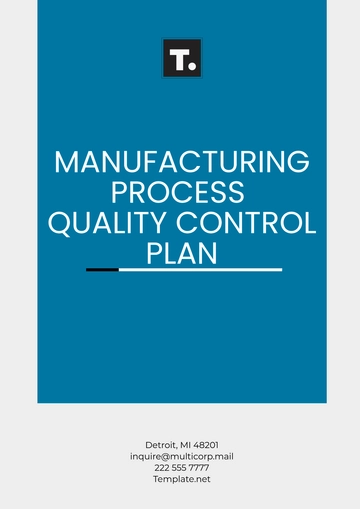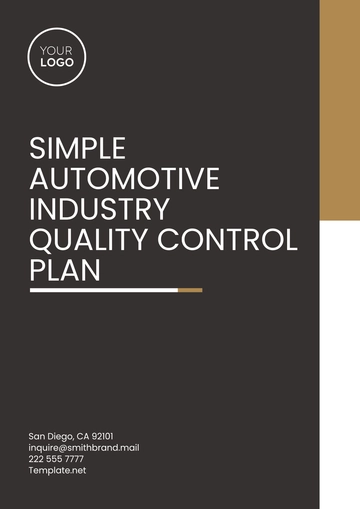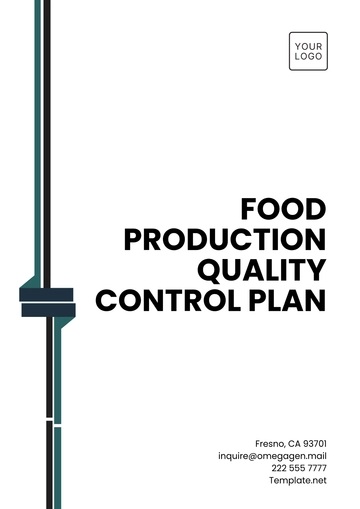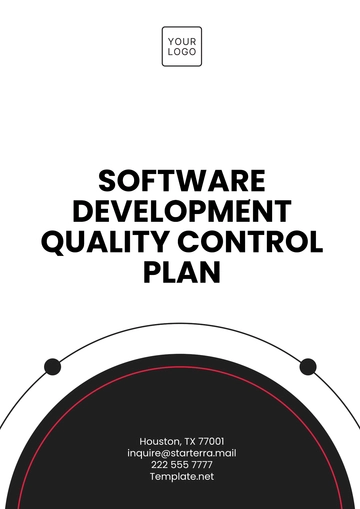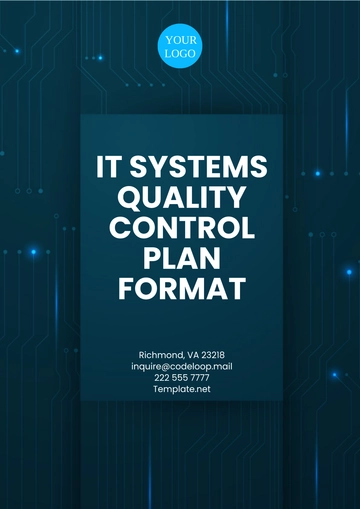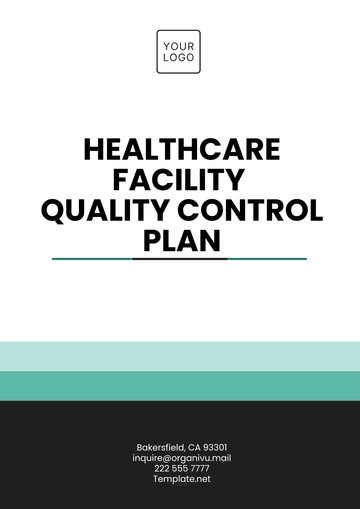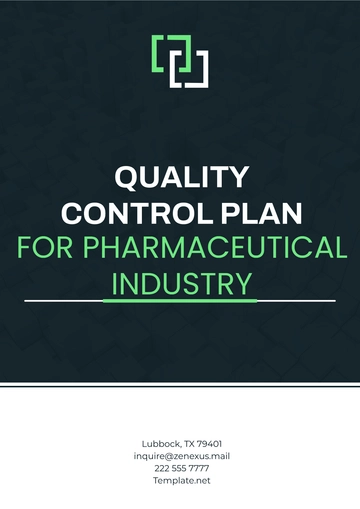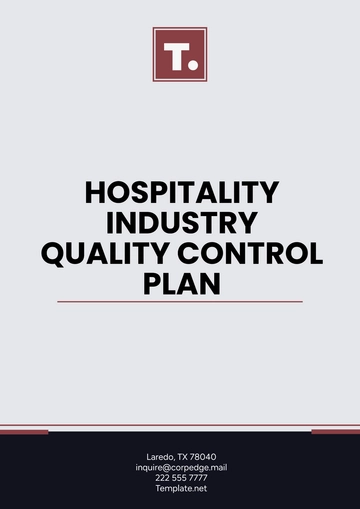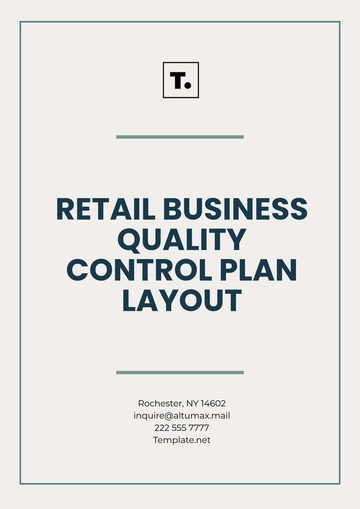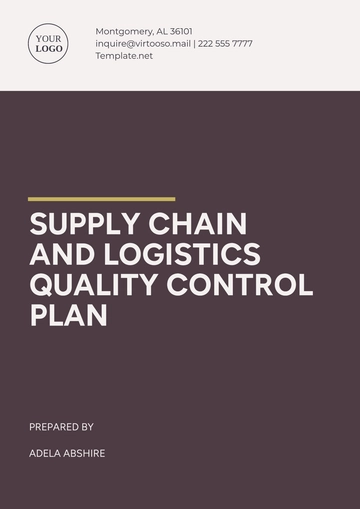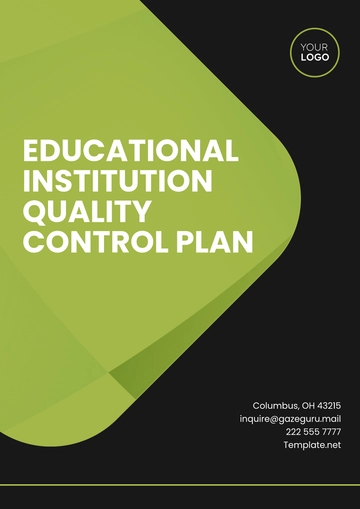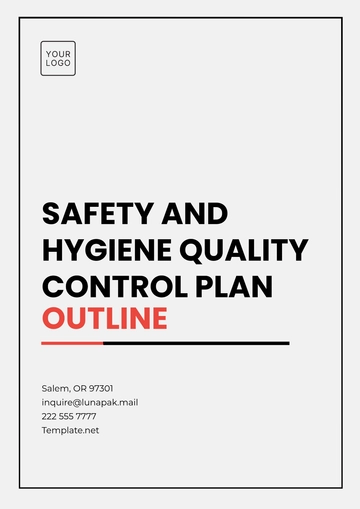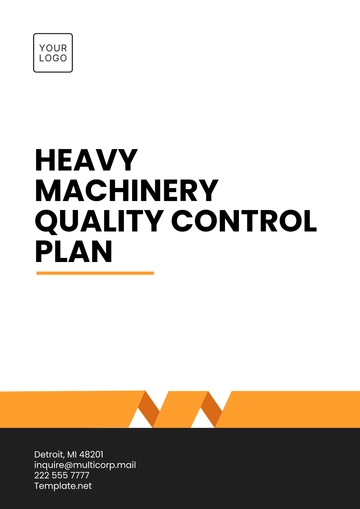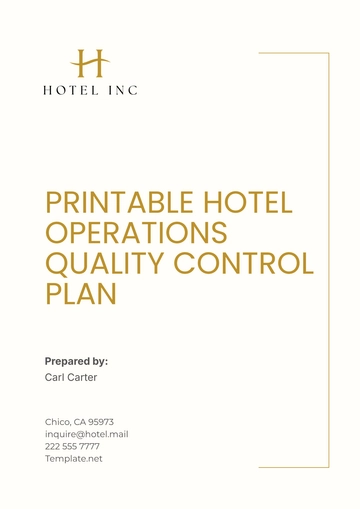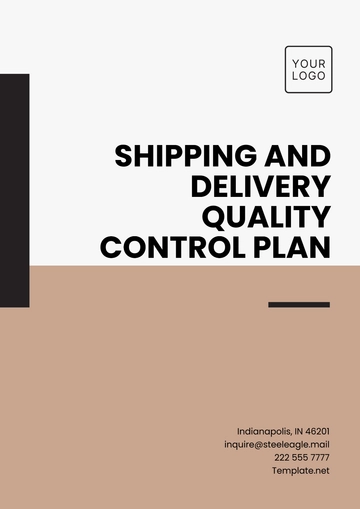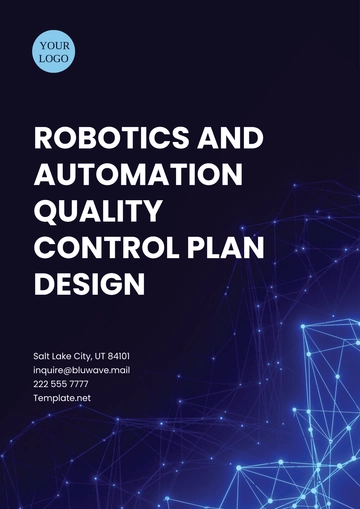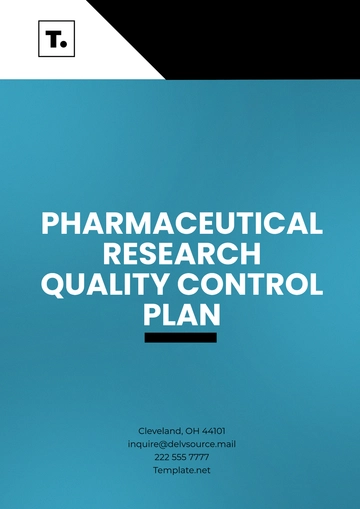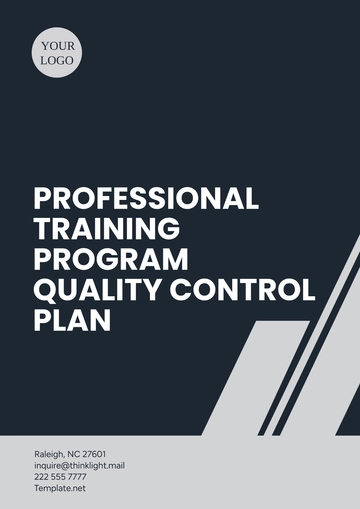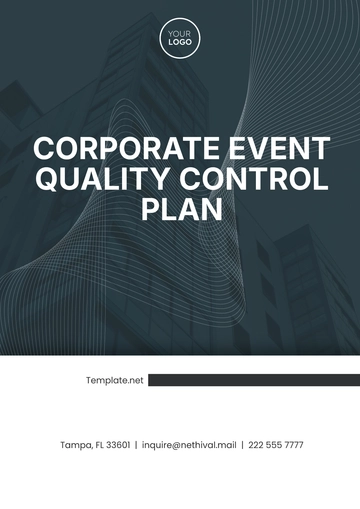Free Educational Institution Quality Control Plan
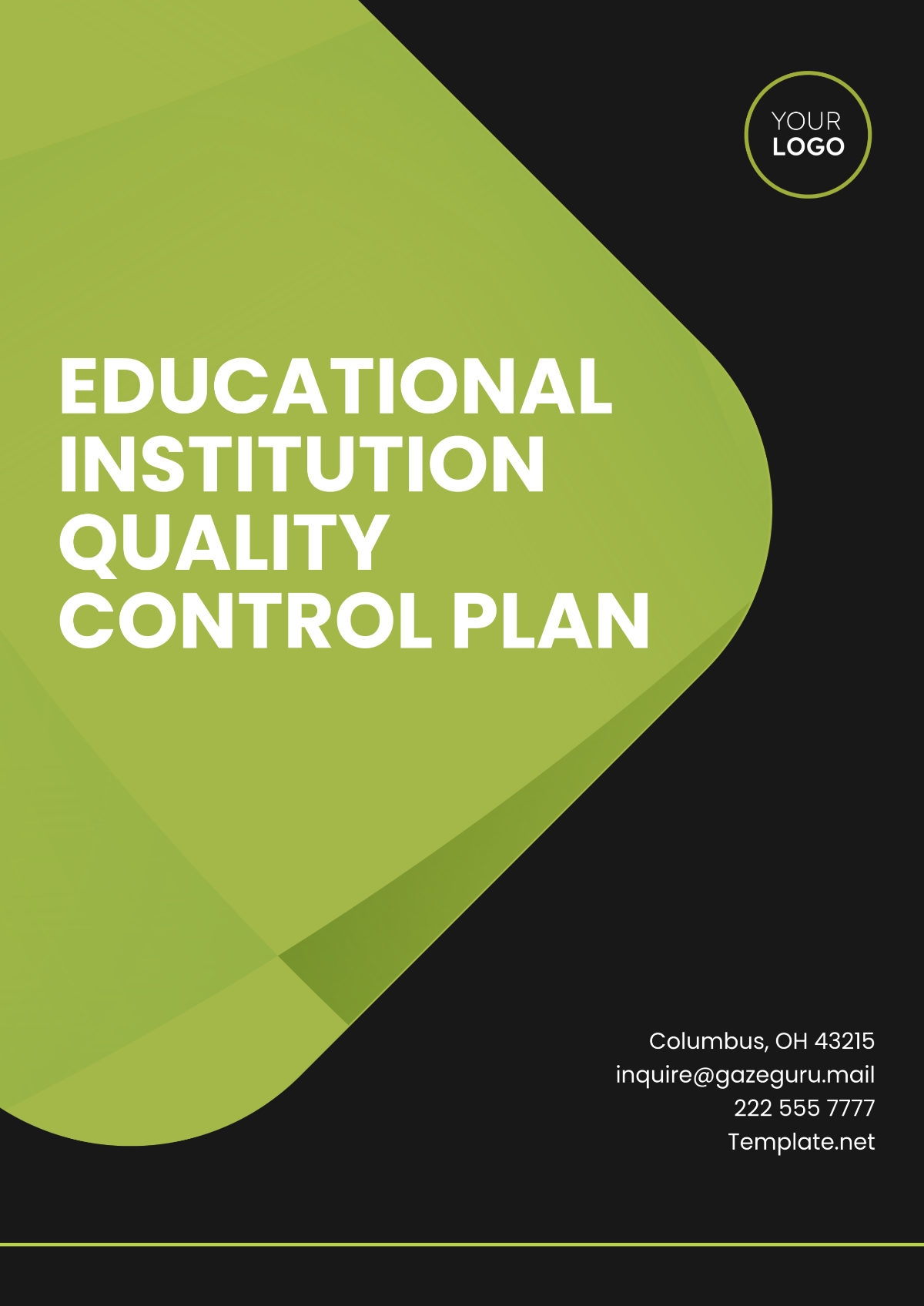
Prepared by:
[Your Name]
[Your Company Name]
1. Introduction
This Quality Control Plan is designed to uphold and elevate the educational standards of our institution. This document is integral to our commitment to academic excellence and institutional integrity. Through structured processes and continuous assessment, we aim to foster a learning environment that supports the growth and success of our students and staff.
2. Objectives
The primary objectives of this Quality Control Plan are to:
Ensure continuous improvement across all educational operations.
Meet and exceed accreditation standards.
Enhance student learning outcomes to prepare them for future challenges.
3. Quality Control Framework
3.1 Governance and Leadership
Our leadership team is pivotal in maintaining educational quality and achieving institutional goals. Their roles include:
Strategic planning and policy development.
Resource allocation to ensure effective implementation of educational programs.
Fostering a culture of excellence and accountability.
3.2 Curriculum Development and Review
We employ a rigorous process for developing, reviewing, and updating our curriculum, ensuring it meets current industry standards and evolving educational needs. This process includes:
Regular assessment and revision of curriculum content.
Incorporating feedback from academic staff, students, and industry experts.
Aligning the curriculum with accreditation and regulatory requirements.
3.3 Teaching and Learning Methods
Innovative, learner-centric teaching methodologies are at the core of our educational approach. We focus on:
Active learning techniques to engage students.
Integrating technology to enhance teaching and learning experiences.
Continuous evaluation and adaptation of teaching methods to meet diverse learning needs.
4. Monitoring and Evaluation
4.1 Performance Metrics
We use key performance indicators (KPIs) to evaluate the quality of our education and the effectiveness of our institution. These metrics include:
Student academic performance and progression rates.
Faculty performance and professional development.
Institutional accreditation status and compliance with educational standards.
4.2 Feedback Mechanisms
Systematic feedback collection from students, staff, and stakeholders is essential. This includes:
Regular surveys and focus groups.
Anonymous suggestion boxes and digital platforms for feedback.
Structured review meetings and action plans based on feedback.
5. Continuous Improvement Strategies
5.1 Professional Development
We offer ongoing training and development opportunities for our faculty and staff. This commitment ensures that our educators remain at the forefront of educational innovation. Professional development initiatives include:
Workshops and seminars on the latest teaching methodologies.
Support for advanced degrees and certifications.
Access to professional networks and conferences.
5.2 Technological Integration
We leverage technology to streamline processes, facilitate learning, and improve efficiency. Key aspects include:
Implementing learning management systems (LMS) for better course management.
Utilizing digital resources and tools to enhance classroom learning.
Adopting new technologies to improve administrative functions.
6. Stakeholder Engagement
Engaging with a broad range of stakeholders ensures our educational practices are relevant and impactful. We engage with:
Students and parents through regular meetings and updates.
Industry partners to align curriculum with market needs.
The community supports local educational initiatives and collaboration.
7. Risk Management and Compliance
We identify and mitigate potential risks while ensuring adherence to regulatory and accreditation requirements. This includes:
Regular compliance audits and reviews.
Developing risk management plans for potential challenges.
Ensuring all institutional practices meet legal and ethical standards.
8. Conclusion
Our Quality Control Plan is essential in achieving academic excellence and maintaining institutional integrity. By adhering to this comprehensive plan, we ensure that our institution remains a leader in education, dedicated to the success and well-being of our students. This document serves as a blueprint for continuous improvement and a commitment to high educational standards.
- 100% Customizable, free editor
- Access 1 Million+ Templates, photo’s & graphics
- Download or share as a template
- Click and replace photos, graphics, text, backgrounds
- Resize, crop, AI write & more
- Access advanced editor
The Educational Institution Quality Control Plan Template from Template.net is fully editable and customizable to fit the unique needs of your institution. Easily modify the plan to ensure effective quality management across all departments. Editable in our AI Editor Tool, this template provides a flexible, professional solution for maintaining high educational standards.
You may also like
- Finance Plan
- Construction Plan
- Sales Plan
- Development Plan
- Career Plan
- Budget Plan
- HR Plan
- Education Plan
- Transition Plan
- Work Plan
- Training Plan
- Communication Plan
- Operation Plan
- Health And Safety Plan
- Strategy Plan
- Professional Development Plan
- Advertising Plan
- Risk Management Plan
- Restaurant Plan
- School Plan
- Nursing Home Patient Care Plan
- Nursing Care Plan
- Plan Event
- Startup Plan
- Social Media Plan
- Staffing Plan
- Annual Plan
- Content Plan
- Payment Plan
- Implementation Plan
- Hotel Plan
- Workout Plan
- Accounting Plan
- Campaign Plan
- Essay Plan
- 30 60 90 Day Plan
- Research Plan
- Recruitment Plan
- 90 Day Plan
- Quarterly Plan
- Emergency Plan
- 5 Year Plan
- Gym Plan
- Personal Plan
- IT and Software Plan
- Treatment Plan
- Real Estate Plan
- Law Firm Plan
- Healthcare Plan
- Improvement Plan
- Media Plan
- 5 Year Business Plan
- Learning Plan
- Marketing Campaign Plan
- Travel Agency Plan
- Cleaning Services Plan
- Interior Design Plan
- Performance Plan
- PR Plan
- Birth Plan
- Life Plan
- SEO Plan
- Disaster Recovery Plan
- Continuity Plan
- Launch Plan
- Legal Plan
- Behavior Plan
- Performance Improvement Plan
- Salon Plan
- Security Plan
- Security Management Plan
- Employee Development Plan
- Quality Plan
- Service Improvement Plan
- Growth Plan
- Incident Response Plan
- Basketball Plan
- Emergency Action Plan
- Product Launch Plan
- Spa Plan
- Employee Training Plan
- Data Analysis Plan
- Employee Action Plan
- Territory Plan
- Audit Plan
- Classroom Plan
- Activity Plan
- Parenting Plan
- Care Plan
- Project Execution Plan
- Exercise Plan
- Internship Plan
- Software Development Plan
- Continuous Improvement Plan
- Leave Plan
- 90 Day Sales Plan
- Advertising Agency Plan
- Employee Transition Plan
- Smart Action Plan
- Workplace Safety Plan
- Behavior Change Plan
- Contingency Plan
- Continuity of Operations Plan
- Health Plan
- Quality Control Plan
- Self Plan
- Sports Development Plan
- Change Management Plan
- Ecommerce Plan
- Personal Financial Plan
- Process Improvement Plan
- 30-60-90 Day Sales Plan
- Crisis Management Plan
- Engagement Plan
- Execution Plan
- Pandemic Plan
- Quality Assurance Plan
- Service Continuity Plan
- Agile Project Plan
- Fundraising Plan
- Job Transition Plan
- Asset Maintenance Plan
- Maintenance Plan
- Software Test Plan
- Staff Training and Development Plan
- 3 Year Plan
- Brand Activation Plan
- Release Plan
- Resource Plan
- Risk Mitigation Plan
- Teacher Plan
- 30 60 90 Day Plan for New Manager
- Food Safety Plan
- Food Truck Plan
- Hiring Plan
- Quality Management Plan
- Wellness Plan
- Behavior Intervention Plan
- Bonus Plan
- Investment Plan
- Maternity Leave Plan
- Pandemic Response Plan
- Succession Planning
- Coaching Plan
- Configuration Management Plan
- Remote Work Plan
- Self Care Plan
- Teaching Plan
- 100-Day Plan
- HACCP Plan
- Student Plan
- Sustainability Plan
- 30 60 90 Day Plan for Interview
- Access Plan
- Site Specific Safety Plan
